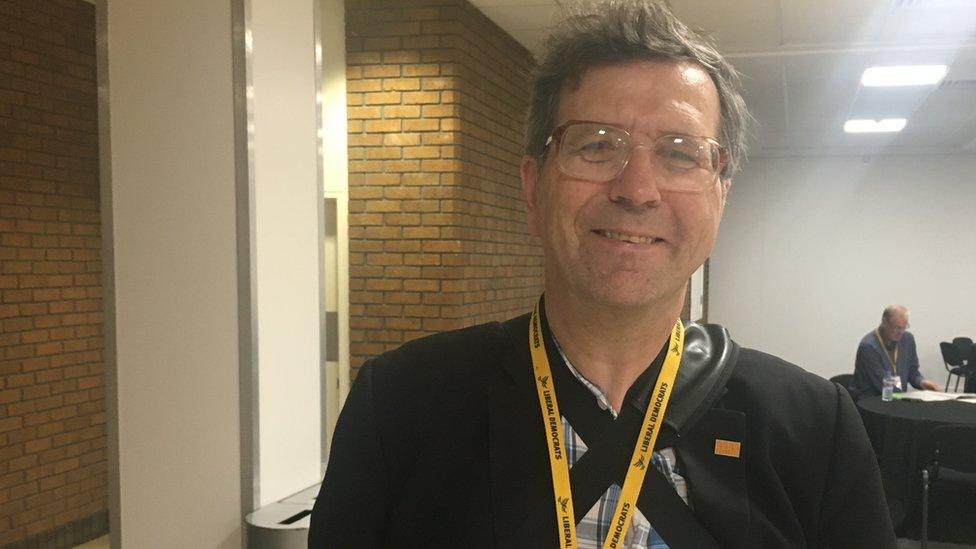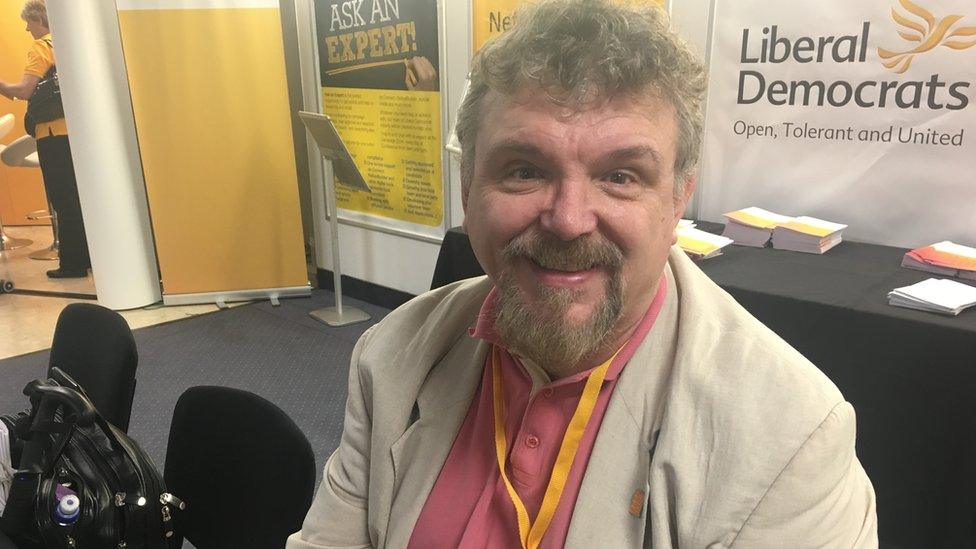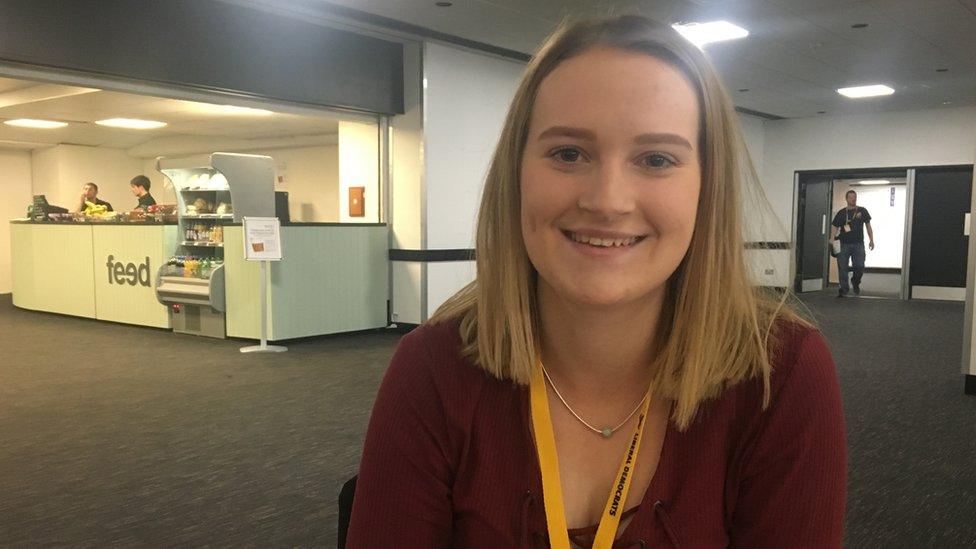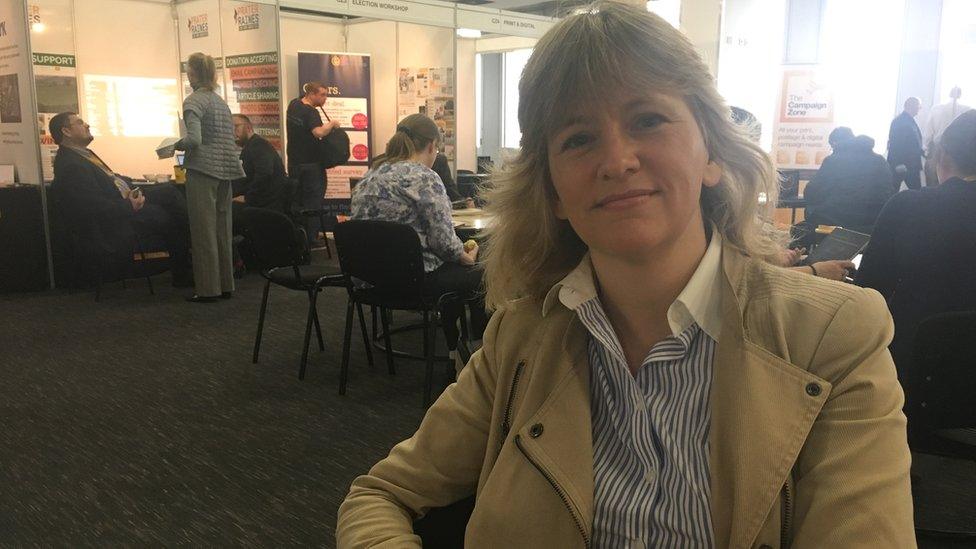Is Lib Dems' pro-EU message its way back?
- Published

Colin Rosenstiel says the UK "will be a lot poorer" outside the EU
The Liberal Democrats saw themselves reduced to a rump of just eight MPs at the last election, and the party is trying to find its way back. Could its pro-EU message be the answer?
"The country is heading over a cliff and the party is trying to talk the country out of it," says Colin Rosenstiel, from Cambridge.
It's an area that voted heavily for Remain, with 73.8% backing continued membership. But the UK as a whole voted to leave the EU by 52% to 48% on 23 June.
Reflecting on the result, Colin says: "We're entering a period of great uncertainty and the outcome is very unclear at the moment."
He says it's an "absolutely crucial time" for "firm leadership" to protect the UK's prosperity, as he attacks what he calls the government's "dithering".
So does he think the Lib Dems are the only one offering that voice? "Yes, the Labour Party can't talk to anybody coherently at the moment."
He's clearly happy with the party's call for a referendum on the terms of the final Brexit deal, with the option of remaining in the EU.
But is it a vote-winning strategy?
"In a way it's less important that it's vote winning than that it's what's right," comes the reply.
'Another referendum makes sense'
Bill Mackintosh, Mid Suffolk, has been a member of the Lib Dems since its formation - and prior to that, the Liberal Party - and he believes the party's position on Europe is an advantage.
Bill tells me that he, like his family, voted to Remain in the EU on the referendum on 23 June, and he welcomes the idea of a referendum on the Brexit deal, as is being called for by leader Tim Farron.
"The referendum on the deal, to me, does make sense," he says, adding: "It's a democratic way of doing things."
"We may still be on the course of leaving after that," he acknowledges, but says: "Of course we'd have to accept that."
But while he thinks the Lib Dem's pro-EU message is one of its key strengths, he doesn't think it's the only route back to power, singling out its policies on social services and the NHS as examples.
Referendum scepticism
I speak to Jenny Crossley, from Bath, who believes that having a clear message on the EU is a "very good thing" - but she's not convinced it's going to bring new people to the party.
Why is that? She tells me she believes most people now think "we voted out, let's suck it up and get on with it", as they are not seeing the "doom and gloom" that was predicted.
"I would like to be proved wrong though," she's keen to add.
Jenny also seems a bit sceptical about the merits of a second referendum on the Brexit deal, which the party is calling for.
"I don't see what it would achieve," she says.
She says the exit deal will be largely that - on the terms of the UK's withdrawal from the EU - with plenty more still to be negotiated in future, such as trade agreements.
"There's not the time and the space or the money to have a referendum on every single trade deal because, let's be honest, 90% of the population is not going to understand it, or probably care."
'Just those who bothered to vote'

Keith Kirwan
But Keith Kirwan, from the Vale of Clwyd, disagrees: "I don't see what choice we've got, or we ignore the first one - and I don't think people would accept that."
He thinks there should be another referendum - and that voting should be compulsory, including for all elections, a point that Jenny agrees with.
He's unhappy that the June referendum didn't operate under such rules.
"It wasn't a majority of the electorate (who voted), it was just those who bothered to vote," he protests.
Changing minds?
So does Keith think the pro-EU message is the party's route back? It's a resounding "yes", as he says the Lib Dems are the only ones to have an "unequivocal" message in favour of staying in the EU.
He points out that 48% of voters in the EU referendum wanted to stay, and he reckons that "quite a few" Leave voters have since changed their mind "as more and more facts come out".
Neither Keith nor Jenny think there's a particular risk the party's stance could alienate the 17 million people who voted Out, as they say many of them wouldn't have voted Lib Dem in the first place - nor cost them votes.
Rather candidly, Keith says: "We've already lost them, might as well be honest."

Ellie is "really optimistic" about the Lib Dems' future
For Ellie Hopgood, from Durham Central, it's good for the party to have a single issue to focus on and be recognised for.
She says UKIP were known for wanting Britain to leave the EU and that most people, when they think of the Conservatives, "think of the economy", but with Lib Dems "you're not really sure".
"So as a single issue to hold on to, definitely," she says.
A fairly new party member, Ellie likes leader Tim Farron's approach to a referendum on the final Brexit deal, rather than saying "we didn't like the outcome (of the referendum), why not just do it again" - especially since the public were trusted to have their say in the first place.
But she says any rejection of the deal by the public should not block Britain's withdrawal from the EU: "The country voted to leave. We have to accept that. It was a democratic process."
"If the deal was rejected it should be a case, if we want to remain democratic, of... going back to the drawing board and perhaps try and negotiate a slightly better deal that the public will be more in favour of."

Jenny Woods says the party "never left"
Ellie also thinks that political parties and the media would need to provide clear information about the terms of the deal, to inform and engage voters.
"I think it's inevitably going to be complex because of how long we've been in the EU... but I think it'll be the way it's portrayed to the public as to whether the public are going to engage with it."
On the Lib Dems' wider future, I ask her how optimistic she is: "I'm always optimistic about it, really optimistic about it."
Her sense of optimism appears to be shared by Jenny Woods, the Lib Dems parliamentary candidate for Reading East.
"What do you mean come back? We never left."